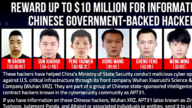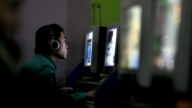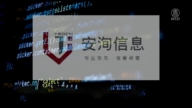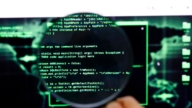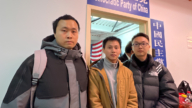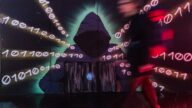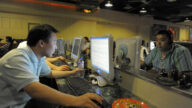【新唐人2012年8月28日訊】多年來,大陸當局建立了世界上最龐大的網絡審查監控系統。根據美國「加州伯克利大學」網站的相關研究,僅「新浪微博」,平均每天就有3個以上的「新敏感詞」被列入黑名單。這意味著,隨著網絡新型媒體的出現,官方審查系統和網民之間的戰爭不斷升級,網民不斷創造新詞彙,使當局疲於封堵。
美國「加州伯克利大學」創辦的「中國數字時代」網站,從去年(2011年)4月開始蒐集被大陸新浪微博禁止搜索的「敏感詞」。截至今年(2012年)8月15號,這個網站上的「新浪微博敏感詞列表」共收錄了1543個敏感詞。也就是說,平均每天都有3.2個新的敏感詞問世。
對此,「全球自由信息運動」創辦人張新宇向《新唐人》表示,中共政府作為一個獨裁政權,面對現代網絡媒體的衝擊,一定會設法進行網絡封鎖。
「全球自由信息運動」創辦人張新宇:「它是用謊言和暴力維持政權的。它要想用謊言的話,如果不去過濾詞的話,它就沒辦法用它的謊言。因此它是必然會去用的。」
去年5月,當中東、北非的「茉莉花革命」不斷蔓延的同時,大陸當局設立「國家互聯網信息辦公室」這一新機構,以便對全國互聯網實行更嚴格的管制。
前中共情報官李鳳智:「現在社會形勢不好了,可能這方面的力度要加大。因為網絡是他們很頭疼的一件事情,因為是一種高科技的、新的傳媒,可以把信息想方設法的傳出去,它捂是不太好捂。現在網絡是它最大的一個挑戰。」
新加坡《聯合早報》分析說,「伯克利大學」的這個列表形象的反映出,隨著互聯網進入2.0時代,網民的防審查招數也進入2.0版,審查機構和網民間「審查與反審查的遊戲」在不斷升級。
去年4月初,微博上被屏蔽的多是「中南海」等未經修飾的詞條,但漸漸的,「liusi(六四)」等拼音也被列入屏蔽範圍。而今年2月王立軍事件爆發後,連「王麗娟護士長(指王立軍副市長)」 「重慶火鍋(指薄熙來)」等隱晦的「代稱」也都被禁。
在反審查的抗爭中,網民們不再簡單使用分隔符號或拼音,將敏感詞略加包裝的方法,而是開始使用變化多端的「代稱」形式,促使大陸微博進入「代稱」時代。
在五花八門的「代稱」中,有取自名字諧音的「康師傅」(指中共政治局常委周永康)、有源自當事人外貌特徵的「墨鏡哥」(指盲人維權人士陳光誠),也有表現地理位置與意識形態特徵的「西紅柿」 (指重慶市唱紅)等。
張新宇向記者分析指出,獨裁專制政權的不斷解體消失,已經成為當今世界潮流,因此中國老百姓對民主自由的要求也是與日俱增。
張新宇:「老百姓、人民的智慧在不斷的增長,這也是必然的。因此對於獨裁政權的統治者來講,他們一定也是要想盡辦法,來對付老百姓這種聰明程度的提高。所以它的辦法就是讓過濾詞不斷的升級。」
今年6月,「香港大學新聞及傳媒研究中心」推出了一個被稱為「微博視野」的項目,它能夠監測「新浪微博」上被審查和刪除的內容。項目的主要研究者傅景華博士認為,與其他國家相比,中國大陸的網絡審查制度是「最龐大和最複雜的」。
根據國際知名的媒體監督組織「無國界記者」發表的最新年度報告,中國大陸的新聞自由度在2011年全球排名榜中繼續下降,位列最底端。在總共179個國家和地區中,中國排名第174位,列全球倒數第6。
採訪/劉惠 編輯/李謙 後製/王明宇
Internet Users Create More Tricks in War Against Censorship.
Creating Havoc for the Authorities.
In recent years mainland authorities have established what
believed to be, the worlds largest internet monitoring censorship.
Research carried out at University of California in Berkeley,
UCB along with ‘Sina Microblog’,
three ‘other’ case sensitive words have become
blacklisted upon the web.
This means, with the emergence of this new type of
network media,
the war is escalating between the official’s review of
the system and the netizens’ anti-censorship.
Internet users are constantly creating new words,
leaving the authorities struggling to block these off.
China Digital Times website, founded in the US at UCB,
began collecting banned search words
from Sina Microblog last April 2011.
By August 2012, a total of 1543 ‘sensitive words’ are said
to be listed upon Sina Microblogs.
Making an average 3.2 new words, deemed sensitive every day.
Founder of the Global Freedom of Information Movement,
Zhang Xinyu, commented to NTD how, as a regime, CCP is
now faced with the global threat of modern network media.
With its constant need to escalate their network and
media blockages.
Zhang Xinyu: “CCP relies on lies and violence
to maintain its regime. If it wants to use lies,
if it does not filter words, there is no way to continue
its lies. Therefore, it is bound to use filtered words.”
May of last year saw the ‘Jasmine Revolution’ spread
across the Middle East through to North Africa.
This sparked CCP in to the action of establishing a new
institution. ‘The National Internet Information Office’.
Allowing them stricter controls upon the internet nationally.
Former Chinese intelligence officer Li Fengzhi: “The social
situations are bad now; the CCP might increase the strength its network blocking.
Network is a very troublesome thing for CCP,
it is a high-tech, new media.
There are many ways to spread information through
networks.
Now network is the biggest challenge facing the CCP.”
Singapore’s ‘Lianhe Zaobao’ analyzed how the list from
University of California, Berkeley,
vividly reflected the Internets version 2.0 and
netizens anti review tricks also entering into the version 2.0 .
The game ‘review and anti-censorship’ is escalating for
review agencies and Internet users.
Early April of last year, censorship to words such as
“Zhongnanhai" began to occur upon Sino Microblog.
Gradually, Pinyin liusi(June 4th) also became blocked.
After Wang Lijun event in February of this year,
even the alluding words such as matron of Wang Lijuan (deputy mayor of Wang Lijun),
Chongqing hot pot (alluding to Bo Xilai) were also
shielded and blocked.
In protest to all anti-censorship, Internet users are no longer
simply using methods such as the delimiter or Pinyin,
nor slightly packaging sensitive words.
They’ve started to use a great variety of ‘codenamed’ phrases,
forming the mainland microblog into a ‘codenamed’ era.
In the usage of such ‘codenames’, Master Kang refers to
Politburo Standing Committee member Zhou Yongkang, as ‘Homophonic’ because of his name.
‘Sunglasses man’ refers to Blind human rights activist
Chen Guangcheng because of his physical characteristics.
‘Tomatoes’ means ‘Chongqing famous red songs’
because of the location and ideology features.
Zhang Xinyu told reporters how the authoritarian regime
continues to disintegrate and disappear,
which has become a major trend in the world today.
Therefore, the requirements of the Chinese people
for democracy and freedom are growing daily.
Zhang Xinyu: “It is inevitable how the wisdom of the Chinese
people is increasing. For the rulers of the dictatorial regime,
they must try every means to deal with the improvement
of the peoples ever growing intelligence.
One of its ways is to constantly upgrade the filtering and
blockading on the web of so called ‘sensitive’ words.”
In June of this year, the University of Hong Kong Journalism
and Media Studies Center, launched a project called ‘microblog vision’.
Its purpose is to monitor the reviewed and deleted content
on the Sina microblog.
The principal investigator of the project Fu Jinghua pointed out,
compared to other countries, mainland China’s Internet censorship is ‘the largest and most complex’.
According to the internationally renowned media monitoring
organization ‘Reporters without Borders’, recently published its latest annual report.
The global ranking chart freedom of press in mainland China
continued to decline in 2011, ranking in globally, bottom.
In all of the 179 countries and regions, China ranked 174.
It is upon a global market, ranked sixth from the bottom.


